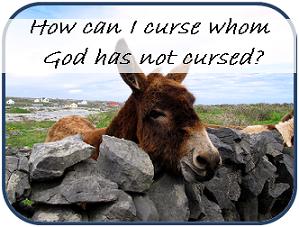He Has Blessed and I Cannot Reverse It A Study in Numbers 22-25
He Has Blessed and I Cannot Reverse It A Study in Numbers 22-25
It’s a familiar story of international conflict. Except that it took place several millennia ago and one of the parties was a nation to whom God had made a commitment. He had made a covenant to be their God and to do them good. So when they were facing genocide in Egypt he rescued them and led them to the land he had promised their ancestor Abraham as a home.
Enter King Balak of Moab. He had a deep-seated hostility towards those people and their godliness. Hatred often breeds fear. And when they came near Balak’s territory he decided they were a threat that had to be destroyed. They were under orders not to harm Moab, but that made no difference to how he reacted.

Fearing they were too strong for him he summoned an occult practitioner from his home near the River Euphrates. God warned Balaam not to go, but the lure of Balak’s honours and wealth was too much for him (2 Pet 2:15). Balaam tried to put a curse on God’s people.
The relationship between the two men is fascinating (two wicked men blaming each other for their failure). So is the contrast between superstition and godliness. But the main point of the story is the care God showed for His people when they were in danger. And that is its special relevance for us. The same covenant commitments God made to Abraham are the property of all who trust and follow Christ Jesus (Mat 28:19 and Acts 2:39). We may expect him to take the same care of His people today as He did then.
A Futile Attempt⤒🔗
The story of Balaam exposes the weakness of every weapon the enemy may use. He tried to use the power of Satan, but could not. When Satan attacked Job he found his activity limited by God. ‘Do not touch his life’. The powers of nature may seem threatening, whether climatic change or cancerous cells. But our Saviour is the one who stilled the storm and healed the leper. Other human beings may pose a threat; either outright enemies or people who act sincerely but unwisely. Sometimes the three come together. Satan may use a time of weakness to stir up an enemy against one of God’s children. But God is sovereign. He had a purpose for Abraham’s descendants.
Balak could not thwart it. And Balaam was compelled to bless the people he had tried to curse. “No weapon that is formed against you shall prosper, and every tongue that rises in judgement against you, you shall condemn” (Isa 54:17). At last the enemy will say, “How can I curse whom God has not cursed?” (23:8).
A Blessed People←⤒🔗
Balaam said they were “not counted among the nations” (23:9). There is a qualitative difference between God’s people and society in general.
They are head and shoulders above the rest. From the mountain top Balaam could see the orderly camp of Israel, very different from the rabble they were thought to be. God’s enemies portray his people as ignorant and his church as chaotic. But from the vantage point of Scripture we see a highly organised group whose activities are coordinated from heaven by Christ. Those activities transcend national and denominational boundaries, and take effect across the generations.
There is orderliness in their relations with one another. God’s laws provide for happy and productive living, in contrast to the unfaithfulness and unhappiness that mar so many communities. First century society noticed that. Early historical documents record people’s comments about this ‘new’ religion. ‘See how they love one another!’ If the church is weak and unsuccessful we should investigate whether we are keeping God’s commands, including Jesus’ command to love one another. If not we have become like the world; no wonder we cannot overcome it.
God’s people are ‘alone’ in the sense of being separated from the mass of fallen humanity and dedicated to God. The Bible calls this being ‘holy’. Like the people of Israel in Balaam’s time God’s people are holy by divine choice, by being redeemed by Christ, by God’s call to them, and by their own response to that. If we are God’s people, are we conscious of our standing in relation to God and to society? Do we value the grace that loved us, the blood that bought us, and the Spirit who dwells in us? Do we take advantage of the resources available to us when we pray? Do we live to please our Father and Saviour?
Balaam realised the people were numerous. It is easy to underestimate the size of God’s family. The numerical decline of the church in the west should not blind us to what is happening. Heaven’s ranks are swollen by the hour. There are ‘generations yet unborn’ who will praise and magnify God (Ps 102:18). And numbers are increasing across the world. It is estimated that in China approximately eight thousand people are converted to Christ every day. There are also ‘hidden ones’ who cannot make a public profession of their faith.
Balaam realised that God’s people prosper even when they die. The early Methodists were often criticised by people who thought they were ignorant and foolish. One reply to that criticism was, ‘Our people die well’. When all is said and done what else matters? Balaam said, “Let me die the death of the righteous and let my end be like his” (23:10). But he did not die the death of the righteous, for he did not live their life (31:8). “What shall it profit a man if he gain the whole world and lose his own soul?”
Their Covenant God←⤒🔗
Why were they so prosperous and safe? Because of the God who lived among them (23:21). He had made a covenant, and he could not break it. If we join the covenant people through receiving Christ Jesus we too will prosper and be safe.
No matter how often Balaam tried to ignore God’s purpose for them he always came up against this: “God is not man that he should lie, or a son of man that he should change his mind” (23:19). No man or devil can reverse the blessing that God has covenanted to give.

He sees no evil in His people (23:21). That does not mean He is unaware of their sins. But when there is no idolatry the relationship holds firm - no breach of faith on either side. More of that later. And He sees them represented by Christ Jesus, ‘the righteous one’.
Balaam said, “The shout of a king is among them”; that is, the shout of a crowd when a monarch is crowned, or of an army when their trusted commander leads them into battle. Everyone knows the difference good leadership makes. It gives both dignity and confidence. When Christ is leading his people “we may boldly say, ‘What can man do to me?’” (Heb 13:6).
Balaam compared God’s people to a lion at rest (24:9). It is said that a lion will rest anywhere. It does not need a safe place, for no one will attack it. Similarly God’s people will conquer till all their enemies are under their feet. And when Christ gives them rest no one will be allowed to disturb. “He has laid a table for me in the presence of my foes” (Ps 23:5).
Not only is there rest, there is great prosperity (24:3-7). All we need is provided. We do not need to go short when love, joy, peace, patience, kindness, goodness, faithfulness, gentleness and self-control are there for the asking (Gal 5:22-23, and Luke 11:13). We have a Father who answers prayer and who will beautify the meek with salvation (Ps 149:4). In short, the picture is of a God who regards his people as ‘the apple of his eye’ (Zach 2:8).
But there is a sequel. Eventually Balaam advised King Balak to befriend Israel. The purpose? To inveigle them into worshipping Moabite idols. And when they did that God made his anger felt against his own people (Num 25).

So long as we keep faith with God nothing can harm us. But if we break his covenant it will be a different story. We must “walk in the light” by confessing our sin and believing God’s gospel of salvation. The Apostle John ends his First Epistle with the words, “Dear children, keep yourselves from idols.”

Add new comment